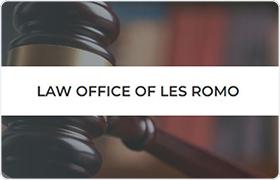Rogers Estate Planning Lawyer, Texas
Sponsored Law Firm
-
 x
x

Click For More Info:
-
Law Office of Les Romo
102 West Morrow Street Suite 202 Georgetown, TX 78627» view mapEstate Law Helping You Understand Your Options
Attorney Les Romo can help protect your interests and resolve your legal issue in the best possible way. Attorney Romo is dedicated to vigorously representing his clients.
800-769-7481
Includes: Gift Taxation
Devon St. Clair Linzy
Tax, Wills, Gift Taxation, Elder Law
Status: In Good Standing Licensed: 11 Years
Patrick J. Ridley
DUI-DWI, Estate Planning, Family Law, Criminal, Estate
Status: In Good Standing Licensed: 51 Years
William T. Wilson
Juvenile Law, Estate Planning, Family Law, Commercial Real Estate, Business
Status: In Good Standing Licensed: 54 Years
Stephen Thomas Brischke
Commercial Real Estate, Wills, Gift Taxation, Business & Trade
Status: In Good Standing
Tom Normand
Estate Administration, Gift Taxation, Estate Planning, Elder Law
Status: In Good Standing Licensed: 60 Years
William J. Linzy
Commercial Real Estate, Wills, Gift Taxation, Business & Trade
Status: In Good Standing Licensed: 55 Years
 Les Romo Georgetown, TX
Les Romo Georgetown, TX Practice AreasExpertise
Practice AreasExpertise
